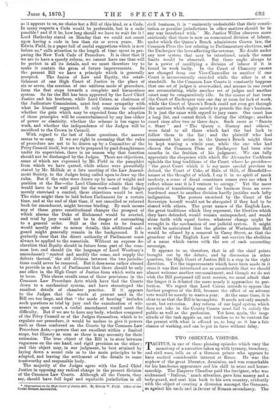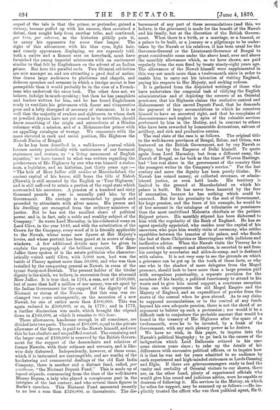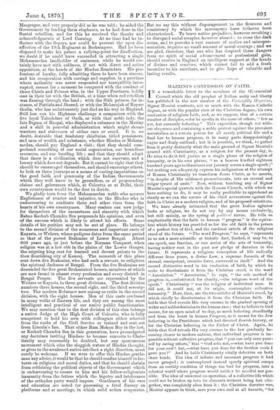TWO ORIENTAL VISITORS.
TACITUS, in one of those pleasing episodes which vary the monotony of a narrative taken up with tyranny, treachery, and civil wars, tells us of a German prince who appears to have excited considerable interest at Rome. Ile was the nephew of the great liberator, Arminius, and was remarkable for his handsome appearance and his skill in arms and horse- manship. The Emperor Claudius paid the foreigner, who was nicknamed "Italicus," much attention, gave him money and a body-guard, and sent him back to his own country, evidently with the object of creating a diversion amongst the Germans, as against his uncle and in favour of Roman ascendancy. The sequel of the tale is that the prince, or pretender, gained a victory, became puffed up with his success, then sustained a defeat, then sought help from another tribe, and continued, per keta, per adversa, as the historian pithily puts it, to annoy his opponents for some time longer. The sight of this adventurer, with his blue eyes, light hair, and comely appearance, displaying, we are expressly told, both a native and a Boman seat on horseback, must have furnished the young imperial aristocrats with an excitement similar to that felt by Englishmen on the advent of an Indian prince. But here the parallel ends. Two Oriental celebrities are now amongst us, and are attracting a good deal of notice. One draws large audiences to platforms and chapels, and delivers speeches and sermons in which a foreign accent is less perceptible than it would probably be in the case of a French- man who undertook the same task. The other does not, we believe, indulge in much speaking ; but then he has pamphlets and leaders written for him, and he has found Englishmen ready to ventilate his grievances with fluent and vituperative pens and a lofty disregard of accuracy of statement. It is as well that the majority of readers and sightseers, to whom dark or jewelled Aryans have not yet ceased to be novelties, should know something of the origin and antecedents of a Hindoo reformer with a mission, and of a Mohammedan prince with -an appalling catalogue of wrongs. We commence with the more elevated in rank and social position, His Highness the Nawab Nazim of Bengal.
As he has been described in a well-known journal which favours society periodically with caricatures of our foremost statesmen and orators, as "a living monument of English injustice," we have turned to what was written regarding the predecessors of His Highness by one who was himself a states- man, a legislator, and an historian, just thirty years ago :— "The heir of Meer Jaffier still resides at Moorshedabad, the ancient capital of his house, still bears the title of Nabob (Nawab), is still accosted by the English as Your Highness,' and is still suffered to retain a portion of the regal state which surrounded his ancestors. A pension of a hundred and sixty thousand pounds a year is annually paid him by the Government. His carriage is surrounded by guards and preceded by attendants with silver maces. His person and his dwelling are exempted from the ordinary ministers of justice. But he has not the smallest share of political power, and is, in fact, only a noble and wealthy subject of the Company." So wrote Lord Macaulay, in his celebrated essay on Lord Clive, in the year 1840, and with the substitution of the Crown for the Company, every word of it is literally applicable to the Nawab, whose name now figures at Her Majesty's levees, and whose portrait has been gazed at in scores of shop- windows. A few additional details may here be given to explain the paragraph of the brilliant essayist. The Meer Jaffier there spoken of is the astute politician who character- istically waited until Clive, with 3,000 men, had won the battle of Plessey against more than 50,000, and who was then installed by the conquering general as Nawab, in room of the tyrant Suraj-ood-Dowlah. The present holder of the titular dignity is the ninth, we believe, in succession from the aforesaid Meer Jaffier. It is true that, in 1764, a sum, not of £160,000, but of more than half a million of our money, was set apart by the Indian Government for the support of the dignity of the Nizamat or statue of the Nazim. But this sum was ex- changed two years subsequently, on the accession of a new Nawab, for one of rather more than £400,000. This was again reduced to £300,000, or so, in 1770; and in 1772, a further diminution was made, which brought the stipend down to £160,000, at which it remains to this hour.
These allowances, handsome enough in all conscience, are divided into two parts. The sum of £60,000, equal to the private allowance of the Queen, is paid to the Nawab himself, and over this he has absolute and unqualified control. The remaining and the larger sum of £100,000 is reserved by the British Govern- ment for the support of the descendants and relatives of former Nawabs, with their retinues and servants, and is like- wise duly disbursed. Independently, however, of these sums, which it is insinuated are contemptible, and are worthy of the huckstering and commercial dealings of the old East India Company, there is another and a distinct fund, called, par excellence, "the Nizamat Deposit Fund." This is made up of lapsed stipends, commencing from the time of the well-known Munny Begum, a lady who played a conspicuous part in the intrigues of the last century, and who several times figures in Burke's speeches. This Nizamut Fund amounted recently to no less a sum than £320,000, or thereabouts. The dis- ibursement of any part of these accumulations (and this, we believe, is the grievance) is made for the benefit of the Nawab and his family, but at the discretion of the British Govern- ment. When there is a birth, or a marriage, or a funeral, or a palace to be built, or a journey or a pilgrimage to be under- taken by the Nawab or his relatives, it has been usual for the Governor-General or the Lieutenant-Governor of Bengal to grant considerable sums under the above head, over and above the -monthly allowances which, as we have shown, are paid regularly from the sum fixed by treaty ninety-eight years ago. The allowances of the Nawab himself were supplemented in this way not much more than a twelvemonth since in order to enable him to carry out his intention of visiting England, paying his respects to Her Majesty, and seeking redress.
It is gathered from the disjointed writings of those who have undertaken the congenial task of vilifying the English administration and of depicting the sorrows of an Oriental pensioner, that his Highness claims the exclusive control and disbursement of this sacred Deposit Fund, that he demands the payment of large accumulations to which he conceives himself to have an ancestral right, and that he complains of discountenance and neglect in spite of the valuable services performed by him in the Mutiny, and in contrast to others who have been rewarded by honourable decorations, salvoes of artillery, and rich and productive estates.
The real state of the case is as follows. The original title to the well-known provinces of Bengal, Behar, and Orissa, was bestowed on the British Government, not by any Nawab or Deputy, but by the Emperor of Delhi himself. To quote again from Lord Macaulay, but from a different essay, the Nawab of Bengal, so far back as the time of Warren Hastings, had "less real share in the government of the country than the youngest writer in the Company's service." For the last century and more the dignity has been purely titular. No Nawab has coined money, or collected revenues, or admin- istered justice, or even held lands. His territory is limited to the ground at Moorshedabad on which his palace is built. He has never been haunted by the fear of annexation, because he has nothing which could be annexed. But for his proximity to the seat of Government, his huge pension, and the force of his example, he would be of less account in the.catalogue of tributaries or pensioners than the most uncivilized Mahratta chieftain or the pettiest Bajpoot prince. His monthly stipend has been disbursed to him with the regularity of the Bank of England. He has an agent specially appointed, who resides near the capital of his ancestors, who pays him weekly visits of ceremony, who settles squabbles between the inmates of his palace, and who floods the last of these Chilperics or Merovingians with judicious and ineffective advice. When the Nawab visits the Viceroy he is received with all respect and attention, is escorted to and from his carriage by secretaries and aides-de-camp, and is deafened with salutes. It is not very easy to see the grounds on which a grievance can be got up in the teeth of these facts, or why one who is the shadow of mere delegates from the Mogul presence, should look to have more than a large pension paid with scrupulous punctuality, a separate provision for the members of his family, a political functionary to attend to his wants and to give him moral support, a courteous reception from one who represents the old Mogul Empire and the Majesty of England, and an expenditure of powder from the stores of the arsenal when he goes abroad. As to any claim to supposed accumulations, or to the control of any funds beyond his own adequate pension, there is not the shred of an argument to bolster up such a pretension ; nor would it be a difficult task to conjecture the probable amount that would be found in the treasury of His Highness after the space of a twelvemonth, were he to be invested, by a freak of the Government, with any such plenary power as he desires. We have no wish, in this paper, to inquire into the Nawab's political biography ; to go back to the causes of the indignation which Lord Dalhousie evinced in his case some sixteen years since ; to rake up the details of his differences with successive political officers, or to inquire how it is that he was not for years admitted to an audience by such experienced and high-minded statesmen as Lords Canning and Elgin. If there are grievancemongers ready to feed the vanity and credulity of Oriental visitors to our shores, there are, on the other hand, plenty of experienced officials who would give him sound and judicious advice, were he capable. or desirous of following it. His services in the Mutiny, on which he relies for support, may be summed up as follows:—He im- plicitly trusted the officer who was then political agents Sir. G.
Macgregor, and very properly did as he was told ; he aided the Government by lending them elephants, as he had done in the Sontal rebellion, and for this he received the thanks and acknowledgments of Lord Canning. At no time had he in- fluence with the Sepoys, nor could he prevent the open dis- affection of the 19th Regiment at Berhampore. Had he been disposed to make his palace a rallying-point for disaffection, we doubt if he could have succeeded in attracting a single Mohammedan landholder of eminence, while he would cer- tainly have met with coldness, if not with direct and active opposition, at the hands of the Hindoo Zemindars. His pro- fessions of loyalty, fully admitting them to have been sincere, -and his co-operation with carriage and supplies, in a province where authority was never suspended nor tranquillity inter- rupted, cannot for a moment be compared with the conduct of those Chiefs and Princes who, in the Upper Provinces, boldly -cast in their lot with the British, at a time when red rebellion was flaming through the land ; with the Sikh princes, for in- stance, of Pattiala and Jheend, or with the Maharajah of Kapar- thulla, who has unfortunately just died on his way to England. -Still less can his Highness challenge a comparison with the five loyal Talookdars of Oudh, or with that noble lady, the late Beg-um of Bhopal, who displayed a calmness in the Mutiny and a skill in peaceful administration which might shame -warriors and statesmen of either race or creed. It is, no doubt, desirable that feudatory chieftains, titled pensioners, and men of wealth and substance, whether Hindoo or Moham- medan, should pay England a visit ; that they should com- prehend something of our social organization, our boundless resources, and our bustling life ; and that they should admit that there is a civilization which does not enervate, and a luxury which does not degrade. But it cannot be right that they should be encouraged themselves, and should encourage others, to look on these journeys as a means of casting imputations on the good faith and generosity of the Indian Governments which they well know to be groundless, or of propounding -claims and grievances which, at Calcutta or at Delhi, their -own countrymen would be the first to deride.
We gladly turn from the Mohammedan noble who accuses -Englishmen of avarice and injustice, to the Hindoo who is -endeavouring to eradicate these and other vices from the hearts of his own countrymen. Many readers can now judge for themselves of the earnestness and sincerity with which Baboo Keshub Chundra Sen propounds his opinions, and even -of the success which is likely to attend his efforts. Some -details of his position may not be out of place. He belongs to the second division of the numerous and important caste of Kayasts, or Writers, whose pedigree dates from the same period as that of the purest Brahmins of Lower Bengal. About 4300 years ago, or just before the Norman Conquest, when religion was at a low ebb in the plains of the Lower Ganges, the reigning king sent for learned and devout priests to the then flourishing city of Kanouj. The monarch of this place sent down five Brahmins, who had each a servant, to enlighten the spiritual darkness of Bengal. From the five Brahmins are -descended the five great Brahminical houses, members of which are now found in almost every profession and every district in Bengal Proper. The five servants are represented by the Writers or Kayasts, in three great divisions. The first division numbers three houses, the second eight, and the third seventy- two. The modern Reformer now among us ranks in the second division, with the eight houses. Men of this caste are found in many walks of Eastern life, and they are among the most intelligent and practical of our native public functionaries. We may mention that to the first division of this clan belongs a native Judge of the High Court of Calcutta, who is fully competent to hold his own with colleagues either selected from the ranks of the Civil Service or trained and sent out from Lincoln's Inn. That either Ram Mohun Roy in the last, or Keshub Chundra Sen in this generation, have promulgated any doctrines inviting Hindoos to become converts to Chris- tianity may reasonably be doubted, but any spontaneous movement which stirs the sluggish waters of Hindoo thought, or gives to the awakened native intellect a right direction, must surely be welcome. If we were to offer this Hindoo gentle- man any advice, it would be that he should confine himself to lec- tures on religious and moral duties, and that he should abstain from criticizing the political objects of the Government which is endeavouring to ensure to him and his fellow-religionists immunity from the fetters which the bigotry and intolerance -of the orthodox party would impose. Gentlemen of his race and education are noted for possessing a fatal fluency on platforms and at meetings, in which solid action evaporates.
But we say this without disparagement to the firmness and consistency by which his movements have hitherto been characterized. To brave native prejudices, however revolting ; to disregard social scruples, however absurd ; to cross the dark ocean, and to provoke a vast amount of malice and misrepre- sentation, requires no small amount of moral courage ; and we are glad, therefore, that one who has despised these dangers from no spirit of social advancement or professional gain, should receive in England an intelligent support at the hands of divines and senators, which cannot fail to add a fresh incentive to his exertions, and to give hope of valuable and lasting results.
































 Previous page
Previous page